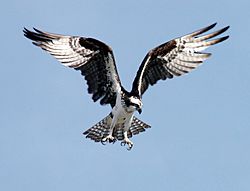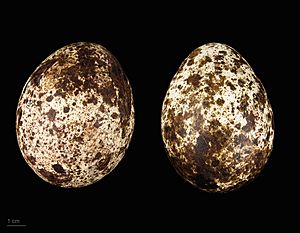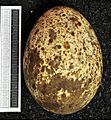Osprey facts for kids
Quick facts for kids Osprey |
|
|---|---|
 |
|
| An osprey preparing to dive. | |
| Conservation status | |
| Scientific classification | |
| Kingdom: | |
| Class: | |
| Order: | |
| Family: |
Pandionidae
|
| Genus: |
Pandion
|
| Binomial name | |
| Pandion haliaetus (Linnaeus, 1758)
|
|
An osprey is a cool bird that loves to eat fish! People sometimes call them 'fish hawks' or 'sea eagles' because they're so good at catching fish. These big birds can be up to 60 cm (24 inches) long, which is about the length of a ruler and a half. They have dark brown wings and a white belly.
Contents
All About Ospreys
What an Osprey Looks Like
Ospreys are pretty big birds! They usually weigh between 1.4 to 2 kilograms (about 3 to 4.4 pounds). From their beak to their tail, they are about 52 to 60 centimeters (20 to 24 inches) long.
When an osprey spreads its wings, they can stretch out from 150 to 180 centimeters (5 to 6 feet) wide! This is called their wingspan.
- Colors: Their back is brown, and their belly is white.
- Head: The head is white with a dark stripe that goes across their eyes.
- Eyes: Their eyes can be golden or brown.
- Beak: The beak (which is like a bird's mouth) is black.
- Feet: Their legs and feet are white, and they have strong black talons (which are like a bird's nails).
Ospreys have a short tail and long, thin wings. It can be tricky to tell male and female ospreys apart, but males often look a bit lighter in color. When an osprey flies, it holds its wings in a curved shape, which makes it look a bit like a gull.
Osprey Homes and Habits
Ospreys are found all over the world! They like to live near water, like lakes, rivers, and coastal areas, because that's where they find their food. They build large nests, often high up in trees or on tall structures like telephone poles.
Their main diet is fish, which they catch by diving feet-first into the water. They have special feet and talons that help them grip slippery fish.
Protecting Ospreys
Ospreys in Scotland
Scotland is a great place for ospreys to live because it has lots of trees and lakes, which are called 'lochs'. However, many years ago, the number of ospreys in Scotland became very low. By 1967, there were only two pairs left! This happened because of people stealing their eggs and hunting them.
To help these amazing birds, a group called the Royal Society for the Protection of Birds started protecting osprey nests. One famous nest at Loch Garten has been protected, and ospreys have returned there every year to breed. Over 1.5 million people have visited to see them!
Thanks to these efforts, the number of ospreys in Scotland has grown a lot. However, it takes time for them to spread to new areas. This is because young ospreys often like to build their own nests close to where they were born. This has been seen in studies done in the USA and Sweden.
Images for kids
-
Western Osprey (Pandion haliaetus) feeding on a recently caught fish. Characteristically its tongue often pokes out whilst swallowing food Kartung, The Gambia
See also
 In Spanish: Águila pescadora para niños
In Spanish: Águila pescadora para niños
 | Bessie Coleman |
 | Spann Watson |
 | Jill E. Brown |
 | Sherman W. White |















